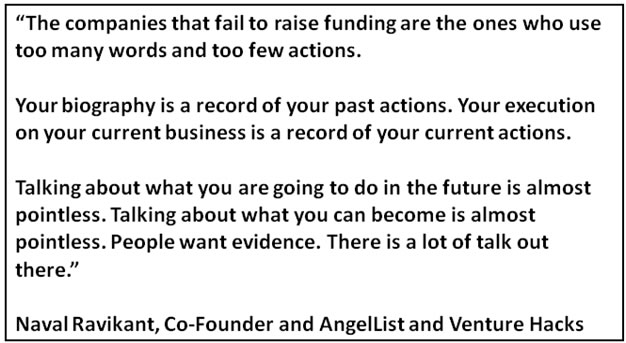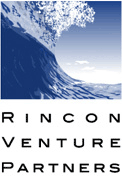 Messenger: Naval Ravikant, Co-Founder AngelList and Co-Maintainer Venture Hacks. Former Founder Epinions. Investor in Twitter, Foursquare, DISQUS, and (by Naval’s own admission) “a lot of other companies you have never heard of”
Messenger: Naval Ravikant, Co-Founder AngelList and Co-Maintainer Venture Hacks. Former Founder Epinions. Investor in Twitter, Foursquare, DISQUS, and (by Naval’s own admission) “a lot of other companies you have never heard of”
Dharmesh Shah, Founder of HubSpot and of OnStartups, recently published a great post entitled, Raising Money On AngelList, which offers insights germane to my conversation with Naval. I recommend you first review Dharmesh’s article and then listen to Naval’s thoughts.
You can watch my interview with Naval below or on YouTube here: http://www.youtube.com/watch?v=IkuXQAvaKgY
What follows is a summary which paraphrases Naval’s responses. For his exact quotes, watch the video.
Value Prop Twitter Style: AngelList is the productization of raising startup funding.
If you haven't already subscribed yet, subscribe now for
free weekly Infochachkie articles!

6) Naval, why does the startup world need AngelList and Venture Hacks?
“As of the last the 9 to 12-months, AngelList is actually my fulltime endeavor. Venture Hacks is educating entrepreneurs on the game theory of how to raise venture capital. AngelList is the productization of that. These days, thanks to code and community, we can productize almost any process done by humans. We are productizing the raising of capital for startups. ”
5) Rincon Venture Partners recently invested in The Resumator, which we identified via AngelList. It is unlikely we otherwise would have become aware of The Resumator, as they are based in Pittsburgh. Are you finding that AngelList is an effective forum for startups located outside of traditional startup hotbeds or was our experience an anomaly?
“It’s actually quite common. The core business we have built on is taking out-of-market startups and introducing them to investors. Late last year, there were more high-quality, seed-stage startups in New York than there was an Angel community to support them.”
4) Venture Hacks and AngelList are both great assets for the startup community. Other than giving back to the ecosystem, do you have plans to monetize your efforts beyond selling books?
“The most important thing for an investor… is access to deals. When great companies really hit, all the investors want in and there isn’t enough room.
One of the things AngelList helps us do is raise our brand, have a pre-existing relationship with many, many entrepreneurs and give us access into great deals. We are not concerned in the short-term with making money. This is a ten year project…, we’re one and a half-years in and we have a long way to go.
Long-term, we may start investing in some of these companies as they go through. We are not taking the incubator approach…we would invest on the same terms alongside the other investors and we would make sure to be a very, very small piece of the round and not to crowd out anybody.”
3) If you were writing your book Pitching Hacks today, how would your advice differ?
“The whole environment has changed. You can cast a much wider net, the nature of the pitch can be a lot simpler, you can get funded with just an executive summary and a good conversation…without having to put together a business plan or even a deck.
The whole thing in some ways is obsolete because the environment has changed. In other ways it is not because human psychology has not changed. That is the great constant.”
2) About 18-months ago, on your Startup Boy blog, you wrote a post entitled “Why You Need to be in Silicon Valley.” Has you positioned evolved with the advent of AngelList making it easier for out-of-market companies to find smart capital and the emergence of regional incubators or do you still think location in SV is imperative for a consumer Internet startup?
“It (my thinking) has changed. It hasn’t changed as fast as I would like it to. I would love it if great companies could stay where they are meant to be, raise financing, execute and do well.
There are two very good reasons to still have a presence in Silicon Valley. One of those is the critical mass of early-stage investors. It is harder to raise money in other areas, you have to show more traction. The second reason is the incredible critical mass of business development, partners…the ecosystem.
It has gotten extremely difficult to recruit in Silicon Valley. I advocate a two-tier structure. Take one or two Founders or core management team members and make sure they either live in Silicon Valley or spend a lot of time in Silicon Valley so they can build the investor and business development relationships they will need, but keep the bulk of the company in the home town where you can actually recruit people and scale without distractions.
One mistake I made early on is I thought, ‘capital is fungible, look at the foreign exchange markets.’ Capital is very mobile, but capitalists are not. The home grown capitalists have to come up. One of the reasons Estonia is such a hot bed of activity for early stage startups because you have a lot of ex-Skype employees who are fairly wealthy and know how to build great products.
Look what Groupon is going to do for Chicago. There’s going to be more and more of these early stage networks forming. Silicon Valley will not be weaker, but the rest of the world will be stronger.”
1) What are the characteristics of companies that do not achieve success on AngelList?
“It doesn’t work for the vast majority of folks. The vast majority of companies are either not financeable or not financeable on AngelList. There is a whole set of companies that are not financeable by the venture community; service businesses, markets that are heavily played out, if you are fighting a war that has already been won…you better have some really core differentiation and traction.
(Other disqualifiers include) not enough technical people on the team…if you are completely out of market…pre-launch companies tend to not do well…teams that have no credibility.
The companies that fail to raise funding are the ones who use too many words and too few actions. Your biography is a record of your past actions. Your execution on your current business is a record of your current actions. Talking about what you are going to do in the future is almost pointless. Talking about what you can become is almost pointless. People want evidence. There is a lot of talk out there.”




